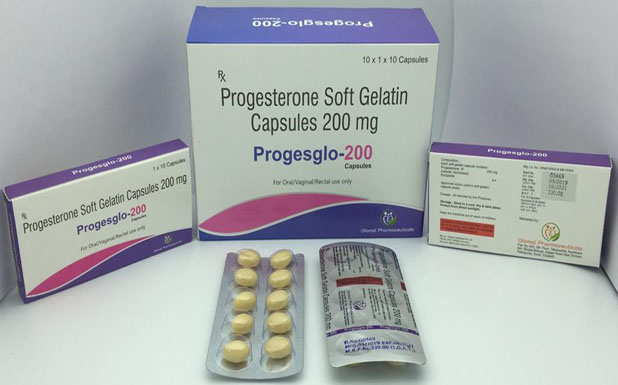Progesterone capsule contain micronized progesterone - female hormone important for the regulation of ovulation and menstruation. Progestin is a general term for a substance that causes some or all of the biologic effects of progesterone. Progesterone is a hormone the female body makes and needs for many health reasons. Progesterone is synthesized from a starting material from a plant source and is chemically identical to progesterone of human ovarian origin. Progesterone is a natural steroid hormone that is found in much higher concentrations in women than in men. It operates harmoniously with estrogen and other steroid hormones involved in physiological functions such as the menstrual cycle and preparing the uterine lining for implantation by a fertilized egg.
Other vital roles of progesterone are building new bone tissues and countering the tendency of estrogen to cause excess growth in the lining of the uterus (the endometrium). Progesterone is a precursor to the hormones estrogen and testosterone. (Estrogen is not actually a single hormone, like testosterone, but a term for a group of related female sex hormones with similar biological activity, mainly estrone, estradiol, and estriol.) If progesterone diminishes, so can these other hormones, which have their own important roles in our physiological health.
Progesterone IP 100/200/300/400 mg
Soft gel
Women Health

Progesterone is used to cause menstrual periods in women who have not yet reached menopause but are not having periods due to a lack of progesterone in the body. It is also used to prevent overgrowth in the lining of the uterus in postmenopausal women who are receiving estrogen hormone replacement therapy.
Progesterone soft gel capsules are an oral dosage form of micronized progesterone which is chemically identical to progesterone of ovarian origin. The oral bioavailability of progesterone is increased through micronization. Progesterone shares the pharmacological actions of the progestins. Progesterone binds to the progesterone and estrogen receptors. Target cells include the female reproductive tract, the mammary gland, the hypothalamus, and the pituitary. Once bound to the receptor, progestins like Progesterone will slow the frequency of release of gonadotropin releasing hormone (GnRH) from the hypothalamus and blunt the pre-ovulatory LH (luteinizing hormone) surge. In women who have adequate endogenous estrogen, progesterone transforms a proliferative endometrium into a secretory one. Progesterone is essential for the development of decidual tissue and is necessary to increase endometrial receptivity for implantation of an embryo. Once an embryo has been implanted, progesterone acts to maintain the pregnancy. Progesterone also stimulates the growth of mammary alveolar tissue and relaxes uterine smooth muscle. It has little estrogenic and androgenic activity.
Drug interactions have not been studied. However, Iron sucrose may reduce the absorption of concomitantly administered oral iron preparations.
Allergic reactions, Low blood pressure, Nausea, Constipation, Headache, Insomnia (difficulty in sleeping), Constipation, Pain at the site of injection